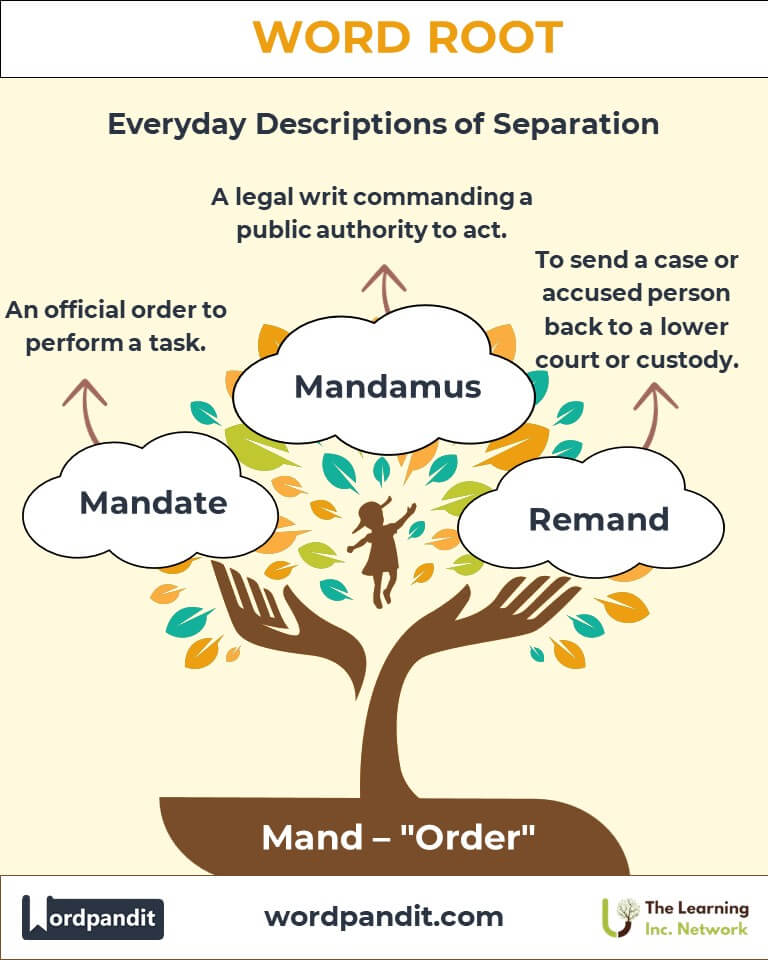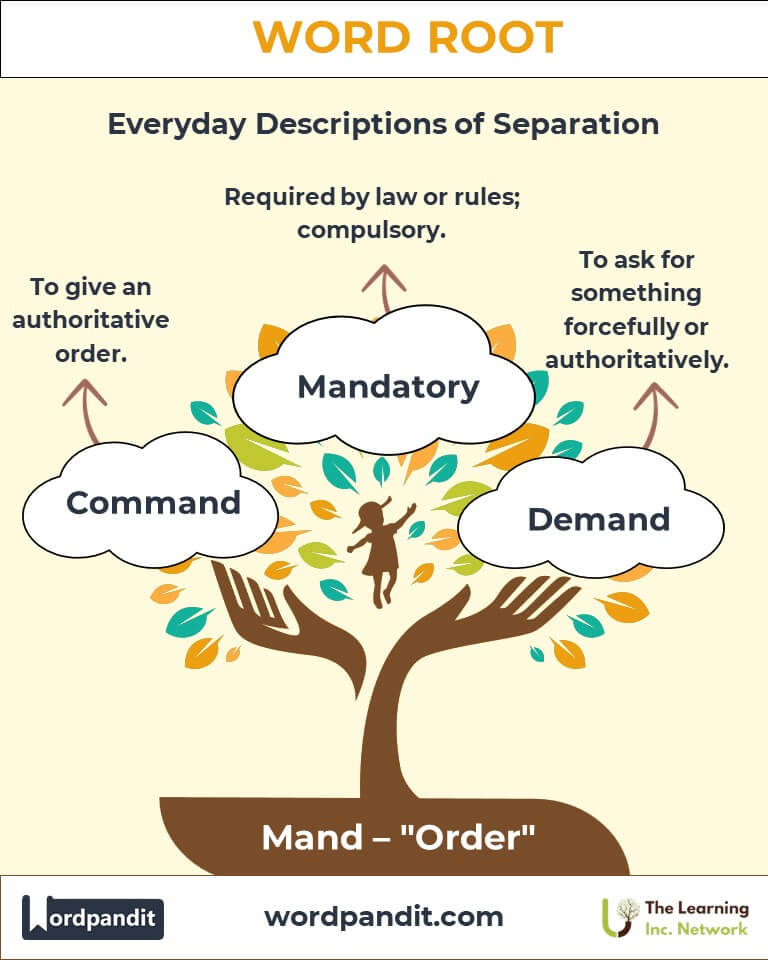Mand: The Root of Authority and Order in Language
Explore the commanding power of the word root "mand," derived from Latin, meaning "order." From everyday commands to mandatory laws, this root is a cornerstone of authority and organization in language and society.
Table of Contents
- Introduction: The Essence of "Mand"
- Etymology and Historical Journey
- Mnemonic: Unlocking the Power of "Mand"
- Common Mand-Related Terms
- "Mand" Through Time
- "Mand" in Specialized Fields
- Illustrative Story: "Mand" in Action
- Cultural Significance of the "Mand" Root
- The "Mand" Family Tree
- FAQs About the Mand Word Root
- Test Your Knowledge: Mand Word Root Quiz
- Conclusion: The Living Legacy of "Mand"
Introduction: The Essence of "Mand"
The word root "mand," pronounced as "mand," is derived from the Latin mandare, meaning "to order" or "to command." This powerful root appears in words that signify authority, obligation, or instruction. From "command" to "mandatory," its presence is felt in language and legal frameworks, symbolizing structure and directive action.

Etymology and Historical Journey
The root "mand" originates from the Latin mandare, combining manus (hand) and dare (to give). Historically, it referred to giving something into someone’s hand with trust or authority. Over time, "mand" has evolved into terms denoting official instructions or obligations, becoming integral to governance, law, and societal structure.
Mnemonic: Unlocking the Power of "Mand"
Picture a royal scepter being handed to a ruler who declares, "This is my mandate." The scepter symbolizes the root "mand," representing authority and the power to order.
Mnemonic: "Mand delivers the command, ensuring every task is planned."
Common Mand-Related Terms
- Command (kuh-mand): To give an authoritative order.
Example: "The general commanded the troops to hold their positions." - Mandatory (man-duh-tor-ee): Required by law or rules; compulsory.
Example: "Wearing seatbelts is mandatory in most countries." - Demand (dih-mand): To ask for something forcefully or authoritatively.
Example: "The protesters demanded immediate action on climate change." - Remand (ree-mand): To send a case or accused person back to a lower court or custody.
Example: "The judge decided to remand the defendant for further questioning." - Mandate (man-deyt): An official order to perform a task.
Example: "The government issued a mandate to improve public infrastructure."
"Mand" Through Time
- Mandatum (Latin): In medieval law, this referred to a written instruction or directive. It laid the foundation for the modern term "mandate."
- Demand (Middle English): Initially tied to formal claims, it transitioned to broader uses signifying firm requests or needs.
"Mand" in Specialized Fields
- Law: "Mandamus" is a legal term referring to a writ commanding a public authority to perform a mandatory duty.
Example: "The court issued a writ of mandamus to enforce the city’s compliance with zoning laws." - Business: "Mandate" defines the scope and authority of an entity to act on behalf of another.
Example: "The agency had a clear mandate to manage the company’s public relations." - Healthcare: "Mandatory reporting" refers to the legal requirement for certain professionals to report specific conditions or actions.
Example: "Doctors are subject to mandatory reporting for contagious diseases."
Illustrative Story: "Mand" in Action
As mayor of a bustling city, Elena issued a mandate to improve public safety by implementing stricter traffic rules. Initially, citizens resisted the mandatory seatbelt regulations. However, after seeing a significant drop in accidents, they recognized the importance of the command. Elena’s leadership demonstrated the transformative power of "mand" to bring order and safety to a community.
Cultural Significance of the "Mand" Root
The concept of "mand" reflects human societies’ reliance on structure and authority. From ancient Roman decrees to modern-day governance, words derived from "mand" capture the essence of organization and compliance. Phrases like "the King’s command" and "mandatory attendance" symbolize its enduring influence in cultural and legal contexts.

The "Mand" Family Tree
- Manus (Latin: "hand"):
- Manual: Pertaining to the hand.
- Manuscript: A document written by hand.
- Dare (Latin: "to give"):
- Donation: Something given as a gift.
- Endow: To give a large gift or bequest.
- Ord (Latin: "order"):
- Ordinance: An authoritative rule or law.
- Coordinator: One who organizes or arranges tasks.

FAQs About the "Mand" Word Root
Q: What does "mand" mean?
A: The root "mand" means "order" or "command" and originates from the Latin mandare, which combines manus (hand) and dare (to give). It embodies the concept of assigning responsibility or issuing an authoritative directive.
Q: What is the origin of "mandatory"?
A: The word "mandatory" is derived from mandare. It originally referred to orders given with trust and authority, signifying an obligation that must be fulfilled, such as rules or laws that cannot be ignored.
Q: How is "mandate" used in modern contexts?
A: A "mandate" refers to an official order or authorization to carry out a specific task. For example, in politics, a government might receive a mandate from voters to implement a set of policies, showing public trust and approval.
Q: What does "remand" mean in law?
A: In legal terms, "remand" means sending a case or an individual back to a lower court or custody for further action. This often happens when higher courts find issues requiring further clarification or retrial.
Q: What is "mandamus" in the legal field?
A: Mandamus is a Latin term meaning "we command." It refers to a court-issued writ compelling a public official or government body to perform a duty they are legally obligated to fulfill but have neglected.
Test Your Knowledge: Mand Mastery Quiz
1. What does the root "mand" mean?
2. Which word means "required by law"?
3. What does "remand" mean?
4. What is the purpose of a writ of mandamus?
5. What does "mandate" signify in governance?
Conclusion: The Living Legacy of "Mand"
The root "mand" is a testament to the importance of order and instruction in human society. From its Latin origins to its modern applications, it underscores the role of authority in governance, law, and everyday life. As language evolves, "mand" remains a steadfast reminder of the power of words to shape action and structure.














